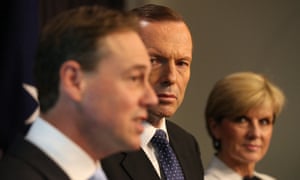Extract from The Guardian
Documents show former PM was briefed on setting up
a taskforce into whether the Bureau of Meteorology exaggerated
records – as claimed in the Australian
Environment minister Greg Hunt, Tony Abbott and
Julie Bishop. Hunt talked Abbott out of investigating the Bureau of
Meteorology over claims in the Australian. Photograph: Mike Bowers
for the Guardian
Daniel
Hurst Political correspondent
Thursday 24 September 2015 09.51 AEST
Tony Abbott considered asking a taskforce to
investigate whether the Bureau of Meteorology was exaggerating
temperature data records following the publication of such claims in
the Australian newspaper, newly
released documents show.
But the environment minister, Greg
Hunt, pushed for the then prime minister to drop the idea.
The documents, obtained
by the ABC under freedom of information laws, show the Department
of the Prime Minister and Cabinet (PM&C) prepared a brief for
Abbott in September 2014 noting that recent articles published by the
Australian had “accused [the bureau] of altering its temperature
data records to exaggerate estimates of global warming”.
The brief said the bureau’s climate records were
“recognised internationally as among the best in the world” and
used “a scientific approach that has been peer-reviewed”.
“Nevertheless, the public need confidence
information on Australia’s, and the world’s, climate is reliable
and based on the best available science,” the then secretary of
PM&C, Ian Watt, wrote.
The issue was raised as part of the establishment
of the PM&C-based
taskforce that would work on Australia’s post-2020 emission
reduction targets to be taken to the UN climate conference in Paris
later this year.
Under the original proposal, the taskforce would
also be assigned the job of “due diligence to ensure Australia’s
climate and emissions data are the best possible, including the
Bureau of Meteorology’s Australian temperature dataset and other
related data”.
The documents show Abbott then asked the foreign
affairs minister, Julie
Bishop, the then industry minister, Ian Macfarlane, and the
environment minister, Greg Hunt, for input on the draft terms of
reference.
In a letter to Abbott in November 2014, Hunt
called for the removal of the due diligence clause, pointing out that
he and his parliamentary secretary, Simon Birmingham, had already
“established a strengthened governance oversight of the bureau’s
ongoing work in this area”.
“It is important to emphasise that this is
primarily a matter of meteorology, statistics and data assurance,”
Hunt wrote.
“This oversight arrangement will involve a panel
of qualified persons, including eminent statisticians, to
periodically review the bureau’s work.”
Hunt said that meant the taskforce proposal would
duplicate work already being done.
“As such, I recommend there be no reference to
the Bureau of Meteorology in the terms of reference, nor to the
taskforce doing due diligence on Australia’s climate and emissions
data.”
PM&C subsequently prepared a new brief for
Abbott suggesting he agree to amending the terms of reference for the
taskforce so that it would merely provide “coordination and advice”
on “quality assured climate and emissions data for Australia”.
The brief said Bishop had “agreed to the removal of reference” to
the bureau.
The department also drafted a letter from Abbott
to Hunt thanking him for working with Birmingham to strengthen
oversight of the bureau’s temperature dataset because “the
credibility of government agencies is important and must be ensured”.
The draft letter included a request for Birmingham
to keep Abbott updated on the outcome of the review.
Last month, Abbott, Hunt and Bishop announced the
government would present the Paris conference with a new target of
reducing Australia’s greenhouse gas emissions by 26% to 28% below
2005 levels by 2030.
Abbott has previously questioned the reliability
of climate science, but when he was prime minister he repeatedly said
he accepted the climate was changing and humans made “a
contribution”. In other public statements, Abbott said coal
was “good for humanity” and wind turbines were “visually
awful”.
Turnbull, who was sworn in as prime minister after
challenging Abbott for the Liberal leadership last week, was deposed
as opposition leader in 2009 over his support for an emissions
trading scheme.
Turnbull last week sought to allay concerns from
conservatives in his party that he might adopt a more assertive
climate policy, saying he supported
the 26% to 28% targets and would retain Hunt’s emissions
reduction fund. But the new prime minister has left
the door open to amending the policies in future, which could
include strengthening
the safeguards mechanism.

No comments:
Post a Comment